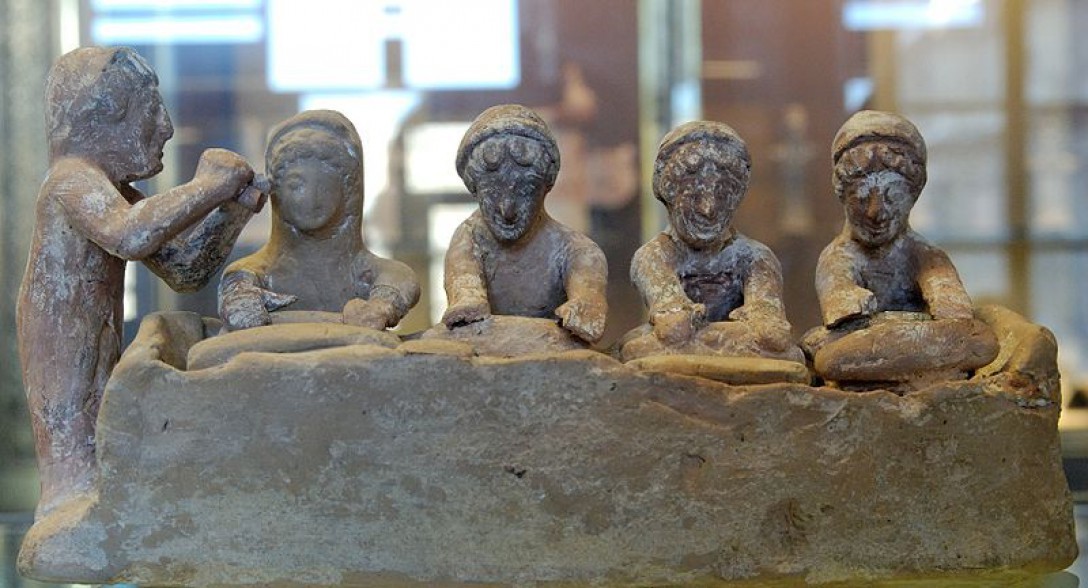By the time of the classical period the early breakfast was called akratisma and, as the name implies, consisted of a piece of bread dipped in unmixed wine (akratos). Sometimes, figs, olives and cheese complemented bread and wine.
The first meal of the day was called ariston and was eaten around noon. Byzantines called it also “lunch”. In one of his poems the 12th century so-called Ptochoprodromos complained that cobbler consumed tripe and Vlachian cheese for breakfast. Βut there is a considerable amount of exaggeration concerning eating in the poetry of Ptochoprodromos.
What did the modern Greeks eat for breakfast?
Until a few decades ago, they ate cheese and bread or rusk with herbal tea or -more expensive- coffee. A cup of coffee and a cookie or a piece of cake was not uncommon for people who lived in the cities. Farmers used to eat papara, herbal tea with rusk, cheese and olives, trahana soup, fruits and cheese. During winter they drank warm wine with pepper and/or cinnamon.
Of course, they got hungry around 11am… it was time for more cheese and bread or a piece of bread dipped in olive oil, a piece of pie or even a small portion of cooked food.
Nowdays, breakfast is not a meal which is paid a great attention. Often it is eaten on the run and many people rush of to work just drinking a cup of coffee.
Now do you understand why I enjoy the Turkish breakfast so much?
Lots of thanks to my dear friends Stavriani and Angelis; they introduced me to this wonderful breakfast!
The first meal of the day was called ariston and was eaten around noon. Byzantines called it also “lunch”. In one of his poems the 12th century so-called Ptochoprodromos complained that cobbler consumed tripe and Vlachian cheese for breakfast. Βut there is a considerable amount of exaggeration concerning eating in the poetry of Ptochoprodromos.
What did the modern Greeks eat for breakfast?
Until a few decades ago, they ate cheese and bread or rusk with herbal tea or -more expensive- coffee. A cup of coffee and a cookie or a piece of cake was not uncommon for people who lived in the cities. Farmers used to eat papara, herbal tea with rusk, cheese and olives, trahana soup, fruits and cheese. During winter they drank warm wine with pepper and/or cinnamon.
Of course, they got hungry around 11am… it was time for more cheese and bread or a piece of bread dipped in olive oil, a piece of pie or even a small portion of cooked food.
Nowdays, breakfast is not a meal which is paid a great attention. Often it is eaten on the run and many people rush of to work just drinking a cup of coffee.
Now do you understand why I enjoy the Turkish breakfast so much?
Lots of thanks to my dear friends Stavriani and Angelis; they introduced me to this wonderful breakfast!
Eggs with kavourma (mutton braised in its own fat)
Fried eggs with pastirma






Your article about Greek food is really interesting to me. I was really surprised when i read this article. Because your breakfast menu is almost same with our breakfast. Moreover, Greek culinary food is quite different but i thing i could be tasty. I really want to cook this food.
I hope one day you can visit Antakya region and taste their amazing varieties Mariana.
Kαι η δική μας ανοιχτή ήταν για μια ολόκληρη εβδομάδα. Ακόμα και στο παρακμιακό ξενοδοχείο που έμενα το πρωϊνό ήταν μεγαλειώδες. Και τι να κάνεις το κέικ που έφτανε φρεσκοφτιαγμένο και ζεστό κάθε πρωί στο μπουφέ όταν είχες μπροστά σου μπουγάτσες και μπουρέκια, ελιές, τυριά, γιαούρτι φτιαγμένο από τους ίδιους και αυτή την απίθανη ποικιλία φρούτων. Και μετά μένω ένα βράδυ στη Θεσσαλονίκη και το επόμενο πρωί αντικρύζω σωρούς από κρουασανάκια, διάφορα κέικ εμπορίου και μπολ με διάφορα δημητριακά… μα επιτρέπεται αυτό στη Θεσσαλονίκη; Ούτε ένα φαγώσιμο χαρακτηριστικό της κουζίνας της;
He didn't say it for nothing. Although breakfast has not only to do with hapiness but is also the beginning of a pleasant trip to Turkish culture.
Μας ανοίγετε την όρεξη.
Cemal Süreya says in one of his poems that: “I don't know what you think of foodBut breakfast has to do something with happiness.”